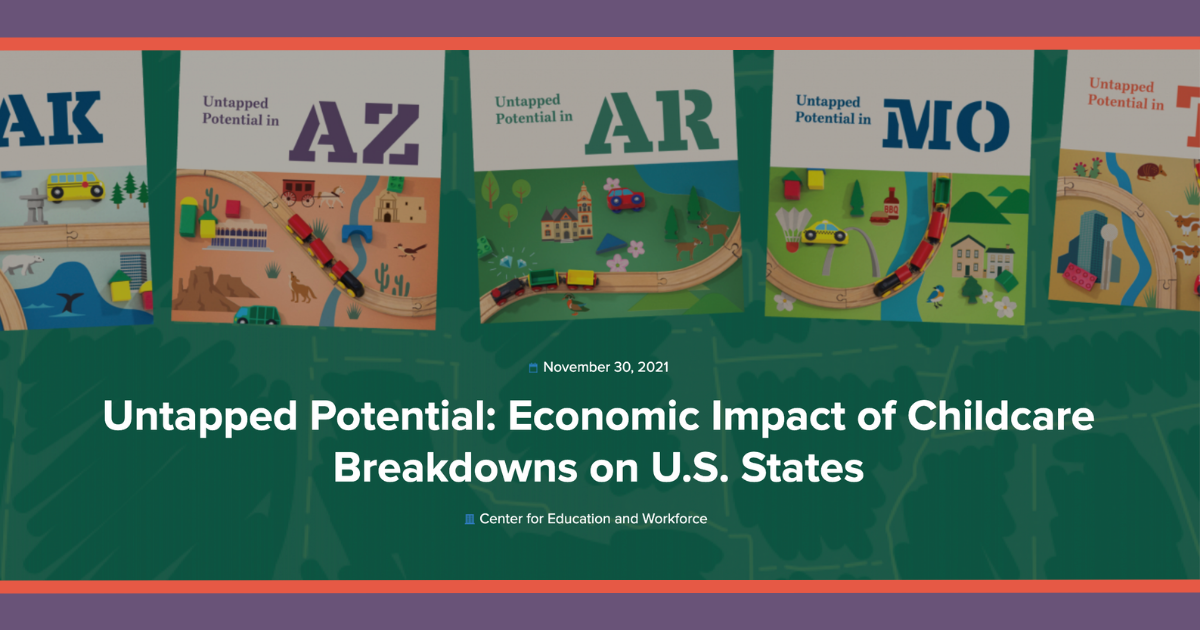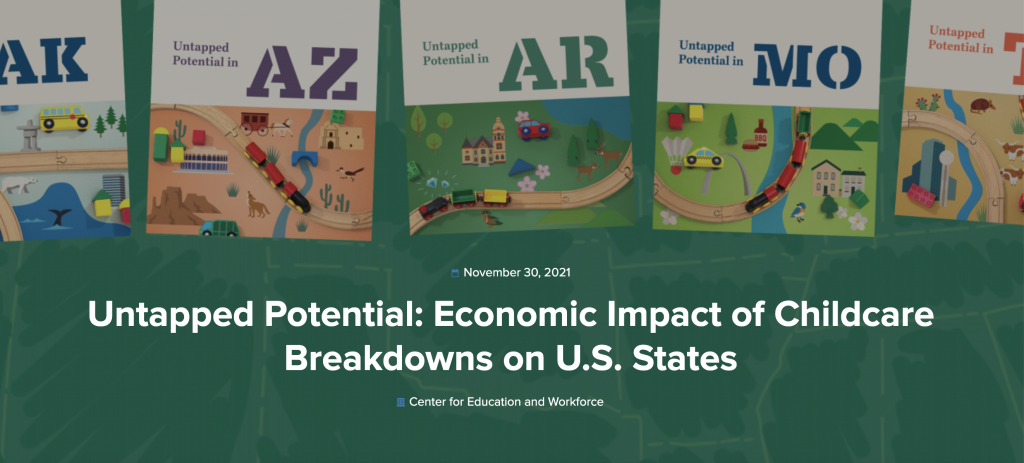States Lose Out on Billions Annually Due to Child Care Breakdowns, Chamber of Commerce Foundation Report Finds

A new US Chamber of Commerce Foundation report has found that Alaska, Arkansas, Arizona, Missouri, and Texas are losing out, on average, on $2.7 billion annually due to child care disparities and breakdowns, underscoring the urgent need for Congress to solve the nation’s longstanding child care and early learning crisis.
“This new analysis reinforces that America’s child care crisis isn’t just holding back working parents and their children, it’s hurting our states’ economies,” said First Five Years Fund (FFYF) Executive Director Sarah Rittling. “The early learning and care provisions included in the Build Back Better Act will give parents the ability to find and afford the options they want and need, and will ensure providers in every community can afford to remain open and staffed by qualified early educators. America’s economic success depends on Congress addressing this crisis.”
According to the report, the states are missing out on the following in economic activity annually:
- Texas: $9.39 billion
- Arizona: $1.77 billion
- Missouri: $1.35 billion
- Alaska: $165 million
- Arkansas: $865 million
Key findings from the 2021 report include:
- Child care issues are forcing parents to leave the workforce. Between 28 and 40 percent of parents reported that they or someone in their household has left a job, not taken a job, or changed jobs because of problems with child care in the last 12 months.
- In the surveyed states, between 55 and 76 percent of parents who voluntarily leave their jobs do so when their child is two years old or younger.
- In total, these states are losing a combined $2 billion from absences and employee turnover, and $528 million annual in tax revenue.
- Child care gaps result in massive economic losses for states. Annually child care issues result in estimated losses ranging from hundreds of millions to almost $10 billion.
A previous Chamber Foundation report found similar economic losses for Idaho, Iowa, Mississippi, and Pennsylvania.
As states continue to lose money due to lack of affordable child care, Congress finally has the opportunity to pass the Build Back Better Act, which will provide funding to states to make child care available and affordable for all families who need it. This report underscores that it is more urgent than ever for lawmakers to solve America’s child care crisis by the end of this year so parents – and economies – in states like Arizona, Texas, Missouri, and more can start to reap the benefits right away.
According to analysis done by the First Five Years Fund, here’s how much the average family in the same states would pay for child care each year under the Build Back Better Act:
- Texas: $876, down from $10,306
- Arizona: $838, down from $11,017
- Missouri: $919, down from $9,782
- Alaska: $1,080, down from $11,832
- Arkansas: $726, down from $9,782
Here’s how the child care and pre-K provisions in the Build Back Better Act will fix the disparities in these states and stimulate their economies:
- Over the first 3 years, a total of $100 billion will be provided to states to fix child care breakdowns and make care more affordable and accessible for families.
- BBB will allow parents to get back to work by expanding access to high-quality, affordable child care to about 20 million children per year, covering 90% of families across the country with children ages 0-5.
- The Economic Policy Institute estimates that the Build Back Better Act would add up to 200,000 jobs in preschool and over 340,000 jobs in child care each year, ensuring that providers have access to quality staff.
- An estimated 51% of Americans live in a child care desert, where mothers are statistically less likely to participate in the workforce. The Build Back Better Act includes dedicated funding to increase the supply of child care so parents have options and can choose the provider that best meets their needs, allowing parents to get back to work and making up for lost economic revenue.
Earlier this year, U.S. Chamber of Commerce CEO Cheryl Oldham wrote an op-ed underscoring the need to “shore up this industry, boost the child care workforce, and support parents who want and need to work,” highlighting how critical child care is to the business community.
The full report from the U.S. Chamber of Commerce Foundation is available here.
Subscribe to FFYF First Look
Every morning, FFYF reports on the latest child care & early learning news from across the country. Subscribe and take 5 minutes to know what's happening in early childhood education.




